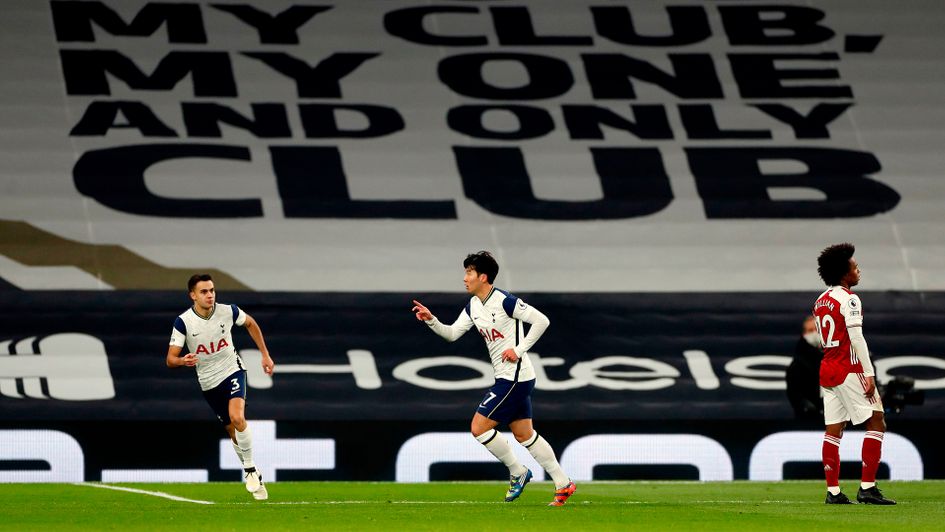Arsenal’s 1-1 draw with Fulham on Sunday is unlikely to live long in the memory.
The Gunners’ record at the Emirates after competing in the Europa League on a Thursday this season is pitiful; they’ve lost to Leicester City, Aston Villa, Wolves, Burnley, Manchester City, Liverpool, and have now drawn with Scott Parker’s Londoners, whose unfortunate 96th minute concession to Eddie Nketiah could well be the final nail in their Premier League coffin.
But it’s not the nature of the game rather the circus surrounding it that will fade this match like a polaroid picture. The Super League discussions which dominated Sunday’s discourse pushed everything else into the shade and now that they have been confirmed, it all feels a little BC/AD - before or after the Super League Sunday.
And yet, Arsenal are arguably the perfect yardstick of how things can change over time. Arsenal’s current position among the 12 breakaway teams is by virtue of what they have achieved up until recently. But it has to be said that the inclusion of both them and Tottenham - who have just two Champions League finals and no wins between them in 60 years, and no league titles in nearly two decades - are the most perplexing.
"I'm disgusted with Man United and Liverpool the most."
— Sporting Life Football (@SportingLifeFC) April 18, 2021
"The owners of these clubs are imposters."
"It's a criminal act against football fans."
"Deduct them points."
"They are bottle merchants."
Gary Neville on the European Super League clubs...pic.twitter.com/1uIPyw72pe
It felt poetic that as Mikel Arteta’s side dragged their tired bodies around the pitch, labouring against a Fulham team desperately trying to save themselves, that a draw was the ultimate result. Arsenal - and indeed Tottenham - are barely able to compete with other teams in England at the moment, let alone a supercharged and rejuvenated European elite.
Arsenal haven’t played Champions League football since Arsene Wenger’s last season in 2016/17. That’s four years outside of the most prestigious club competition in which 32 teams compete each and every year. Their Champions League form, as far as the UEFA coefficient is concerned, is effectively over, with the governing body taking those points from the previous five seasons.
But they are owned by Private Equity, and powerful private equity at that. Stan Kroenke’s empire includes ownership in the major American sports, including the Los Angeles Rams in the NFL, the Denver Nuggets in the NBA and Colorado Avalanche of the NHL, among others. These are franchises, created in closed shops where no-one is relegated, broadcasting deals are split equally among the members and where it doesn’t matter how bad you are - you are guaranteed a cheque.
Kroenke, along with other ambitious Americans John W Henry at Liverpool and Joel Glazer at Manchester United, are known to have been pushing for this model. It guarantees a minimum revenue every season, while not qualifying for the Champions League, as could yet befall four of the six English Super League participants, does not. It’s a reward for pulling up the shutters behind you, rather than beating the team in front of you.
Anyone disagree with Roy Keane and Micah Richards over the 'greed' of the European Super League?
— Sporting Life Football (@SportingLifeFC) April 18, 2021
No, didn't think so...pic.twitter.com/g15W0c1i8m
And that’s ultimately good for business, and good for investors. There’s numbers they can work around - not knowing whether £60-£70m of Champions League money might or might not come into the club is a problem they will likely not have going forward.
It’s wrong to criticise only the London clubs; the entire sleazy manoeuvre is a slippery, soulless, emotionless land grab made by people who might have been in football for a long time, but still have no idea what it means or represents. They can claim to in their empty statements, but the feeling is gone.
And the point is that if we take snapshots at other points in history, a closed shop Super League is markedly different, from a Nottingham Forest of the 1970s, an Aston Villa or PSV from the 1980s, an Ajax from the 1990s or even a Monaco or Porto from the 2000s. There is no God-given right to sit at the top table and that’s what has always separated football from the franchises. Positions have to be earned, to be retained, by virtue of a pyramid of success or failure.
But the opposite is being fed to us, seemingly whether fans like it or not. Whatever happens next, it feels like football has reached a point of no return.






